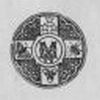THE
GOSPEL OF ST. JOHN.

THE
GOSPEL OF ST. JOHN.
A Series of Discourses.
BY
FREDERICK DENISON MAURICE, M.A.,
PROFESSOR OF MORAL PHILOSOPHY IN THE UNIVERSITY OF CAMBRIDGE.
"Johannes redet schlecht und einfältig wie ein Kind, und lauten seine Worte(wie die Weltweisen sie ansehen) recht kindisch. Es ist aber eine solche Majestätdrunter verborgen, die kein Mensch, so hoch er auch erleuchtet ist, erforschennoch ausreden kann."—Luther, Auslegung des Evangel. Johannis, 1, 5.
NEW EDITION.
London:
MACMILLAN AND CO.
1882.
[The Right of Translation and Reproduction is Reserved.]
London:
R. Clay, Sons, and Taylor
BREAD STREET HILL, E.C.
PREFACE TO THE SECOND EDITION.
A valued friend, to whose judgment on a critical questionI shall always defer, has sent me the following observationsupon certain passages in the 11th and 16th Discoursesof this volume. I have made no alterations in the text.
John v. 3, 4.
It is implied at page 143 that certain "honest and earnestmen" are unwilling to believe that St. John wrote the verserelating to angelic interposition in the cures wrought by thepool of Bethesda, merely because they consider the doctrineunworthy of him. It may be so: but it is at least possible toassent fully to the doctrine, and yet reject the verse, along withthe last clause of the preceding verse, on purely outward andcritical grounds. Of the six most important Greek MSS. two(and those, perhaps, the best) omit the whole passage,ἐκδεχομένων—νοσήματι,two the clause, ἐκδεχομένων—κίνησιν,and two the verse, ἄγγελος—νοσηματι:not more than one or two tolerableGreek MSS. support the received reading. Of importantearly versions three omit the whole passage (including therecently discovered "Curetonian" Syriac, probably the earliestand most important of all), another (and two MSS. of a second)omits the verse, and two others omit or obelize part of theverse. Of early patristic evidence there is hardly any eitherway. Origen's commentary between iv. 54 and viii. 19 is unfortunatelylost. Tertullian in one place shows an acquaintancewith the belief about the angel, and probably with the wholepassage. With this exception, the passage appears to be knownin either form to no Father previous to St. Ambrose, no GreekFather previous to St. Chrysostom: they and their successorsfollow the common text. The only important early authorityin its favour is the Old Latin version, (with which must betaken Tertullian;) and yet its MSS. differ surprisingly in thedetails of the verse, presenting it for the most part in a shorterform than the Greek MSS., which likewise differ considerablyamong themselves. In short, all the familiar phenomena ofinterpolation are present in the most flagrant shape. In allprobability the passage was added by degrees in the secondcentury in the Western Church, and passed over to the East inthe fourth century.
John vii. 53-viii. 11.
At page 229 "some of the Fathers" are said to have "dislikedthe moral of" the story of the woman taken in adultery,and therefore to have been "glad to believe it not genuine."It is nee